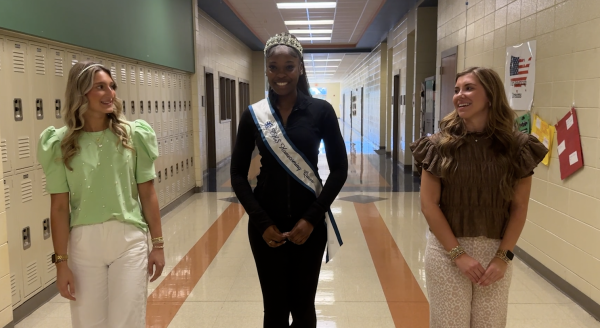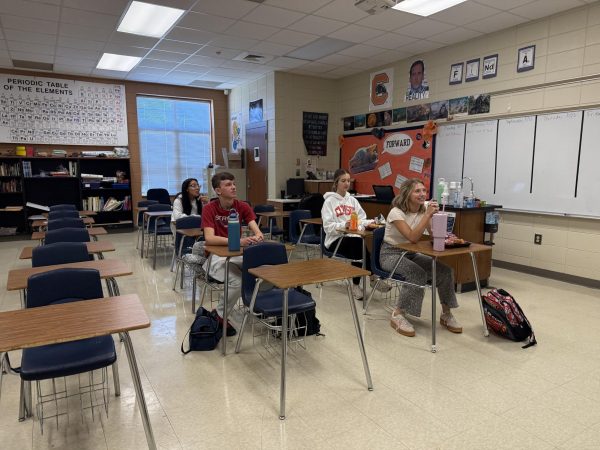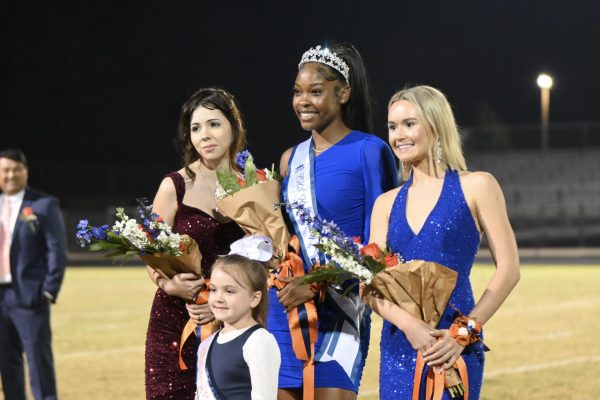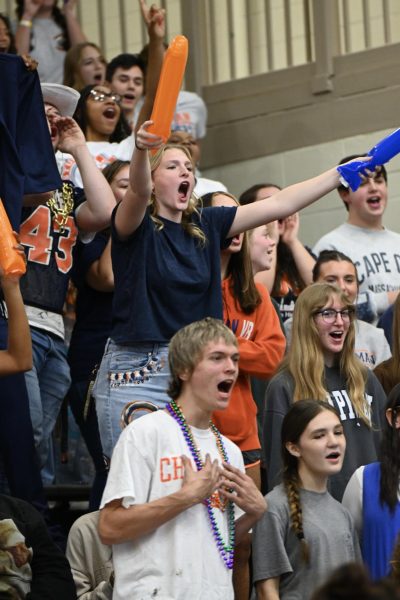What it takes to be number one
Imagine the feeling of getting your name called in front of all of your classmates, families and friends.
Four years of tears, stress, sleepless nights and panic attacks have led you to this: valedictorian.
Of course, being valedictorian and ranked number one out of your entire class is a huge honor, but is it worth it?
Normally, when you think of valedictorian, you think of the best student in the graduating class.
Is that really the case, though?
For Thomas R. Guskey, professor of educational psychology at the University of Kentucky, the sheer idea of putting students in a quantifiable rank does nothing to encourage learning. Instead, it perpetuates existing order.
“Rank-ordering the students in every graduating class has nothing to do with developing student talent,” Guskey said in his article “Class rank weights down true learning.” “Rather, it is unquestionably about selecting talent.”
Guskey argues that determining class rank doesn’t help improve efficiency in school but instead causes students to lose motivation to continue working as hard as they have been.
After all, four years is a long time to let pressure and school take over your entire life.
Here’s the big question: Is valedictorian really worth it?
There is one student in each grade level who holds the number one spot, but it can change at any time.
Many times, there is .005 or fewer points separating the GPA of the valedictorian and the salutatorian.
The pressure is all-consuming; it comes from both the student and from others around him or her.
“There’s a higher sense of responsibility, and I feel like people expect more out of me,” sophomore Chandler Adams, currently number one in his class, said.
Some students believe that class rank is something that institutions of higher education find important, but that’s not necessarily the case.
In a survey of member colleges conducted in 2012 by the National Association for College Admission Counseling, only 12 percent of colleges thought class rank was “considerably important.”
Despite this, being number one is sometimes, pardon the pun, the number one priority of some students.
Some because that is what is expected of them; some because they are too competitive to let others beat them.
“The process of selecting a class valedictorian based on the highest weighted GPA harms more students than it helps,” Guskey said. “It pits students against each other in sometimes bitter rivalries.”
Valedictorians are determined solely on GPA, but Guskey suggests schools should consider other criteria.
“What about other qualities, such as commitment to service, compassion, integrity and a sense of social justice?” Guskey said. “Where do curiosity, initiative and creativity come in?”
Does it truly make sense for someone to be honored in such a prestigious way just because they have the highest GPA?
There are some students with high, but the not the highest GPAs, that have played sports, participated in school clubs and organizations and have been a part of school programs and those activities are not considered when determining valedictorian.
Chapman Principal Ty Dawkins believes valedictorians should possess certain personal characteristics.
“(I feel they should possess) leadership, integrity, drive, initiative, responsibility, gratefulness and be well-rounded,” Dawkins said. “What I mean by well-rounded is doing other things other than coming to school and going home.”
That has certainly helped Adams.
“I worked hard in and out of school to become a well-rounded student,” Adams said.
Karen Arnold, one of the authors of “Should Schools Have Valedictorians,” believes that being named valedictorian is a huge honor that should still exist.
“In the high school hierarchy, wearing a honor society graduation tassel isn’t near as cool as wearing a varsity letter jacket,” Arnold said. “But being valedictorian is the one academic honor that does matter to students. We understand that athletes and performers merit special honors because their achievements represented hard work, focus, and motivation. So why shy away from awarding honors to students who succeed in academics?”
Dawkins thinks it is important to follow the policy.
Page 44 of the Chapman student handbook states:
“The senior class valedictorian will be an honor graduate with the highest grade point average at the end of eight semesters.”
And what is an honor graduate? According to the handbook, the definition hinges on a few characteristics: “(S)tudents should be in the process of earning 30 units, have completed eight semesters of high school work with two senior year semesters of residency in the respective school; and have earned a grade point average of 3.62 or above at the end of his/her eighth semester; and have all grades during his/her senior year 70 or above.”
Another problem many on this quest for the highest GPA face is truly learning material.
Some students become so concerned with the grade that they fail to actually learn what they are supposed to learn.
This isn’t the case for all, though.
“I believe (the grade and material) almost fall hand in hand because you need an understanding of the material to get the grade,” Adams said.
That’s debatable. For some, it certainly does. For others, rote memorization is key.
The problem with rote memorization is that those memorized facts or concepts are easily forgotten or not-so-easily transferable.
In an article written by Ben Orlin, a high school teacher, Orlin expressed the regret he had for not letting his precalculus students use a formula sheet during tests.
He said that during his first trigonometry class that he taught, he asked the students what the sine of π/2 was.
They then responded with “one” because “we learned that last year.”
Later on in the class he then found out that his students didn’t even know what the word “sine” meant. All along, they had used memorization to remember what π/2 is.
“Some things are worth memorizing–addresses, PINs, your parents’ birthdays,” Orlin said. “The sine of π/2 is not among them.”
Orlin’s example is only one example, of course, but the point still stands: If students are succeeding through memorization only, are they really learning anything, even if they have a high GPA?
Adams argues that multiple factors must be considered when defining intelligence.
“Not everyone performs the same on things like tests so intelligence can’t be based solely on classroom knowledge,” Adams said. “There are so many things that go beyond what we learn in school.”
With great grades comes great stress. Dawkins acknowledges this.
“I would tell students that I appreciate you being stressed about class rank,” Dawkins said. “However, look at the big picture.That is something to be proud of. Look back at that and I want you to enjoy your four years. I want you to be successful, but I want you to be happy. Don’t miss out in high school because you’re stressed about class rank.”
Adams encourages people to remain humble.
“Stop thinking of yourself as number one and don’t let the title give you a superior feeling over others,” Adams said.
Junior Stan Ashmore believes that staying calm is the key to handling stress.
“I handle stress by not becoming overwhelmed with all the responsibilities that come with taking advanced classes,” Ashmore said. “I try not to stress about the grades I make and just work and study to better them the next chance I get. I don’t stress myself because I know if I just stay relaxed that I will do better and be able to comprehend what I learn better.”
He also thinks that having positive people around you, stress can be relieved.
“I don’t really feel stress from others because the people I surround myself with are supportive of me and don’t bring me down if I don’t do well and make a bad grade,” Ashmore said. “While your GPA and the grades you make are very important, it is not necessarily the most important thing in high school. I try to keep a good balance of my studies to have a good GPA but also hanging out and having fun with friends. If you just study all the time and don’t have any fun, you’re just going to be stressed. You need to be able to relax and not worry about grades for a little bit, and then be able to get back to studying hard to support a good GPA.”
So what’s it like to be honored as valedictorian?
Math teacher Rebecca Pack knows.
She tied for first in Chapman’s class of 1994.
The school accommodated her and her co-valedictorian, allowing each student to give a speech.
While being named valedictorian was an honor, she said it never really influenced her future.
“I had already decided what school I was going to and had scholarship money lined up,” Pack said.
While some people work for number one, it was never her goal.
“Being number one in the class wasn’t my goal,” Pack said. “Throughout high school, I was always second, but I wanted to do my best in all my classes.”
It’s easy to let trying to do your best become trying to be the best, but the stresses might not be worth it.
There are, of course, plenty of successful people — wealthy, healthy and wise — who didn’t finish number one in their high school classes.
Here’s the thing: Students have to be careful not to let their grades become the measure of their self-worth.
Pack offers suggestions to those who would misplace their priorities during the fight for first:
“When you’re in the middle of it, it seems like the most important thing in the world, but don’t stress yourself so bad. Sometimes you have to choose priorities and leave others behind.”
Your donation will support the student journalists of Chapman High School. Your contribution will allow us to purchase equipment and cover our annual website hosting costs.





